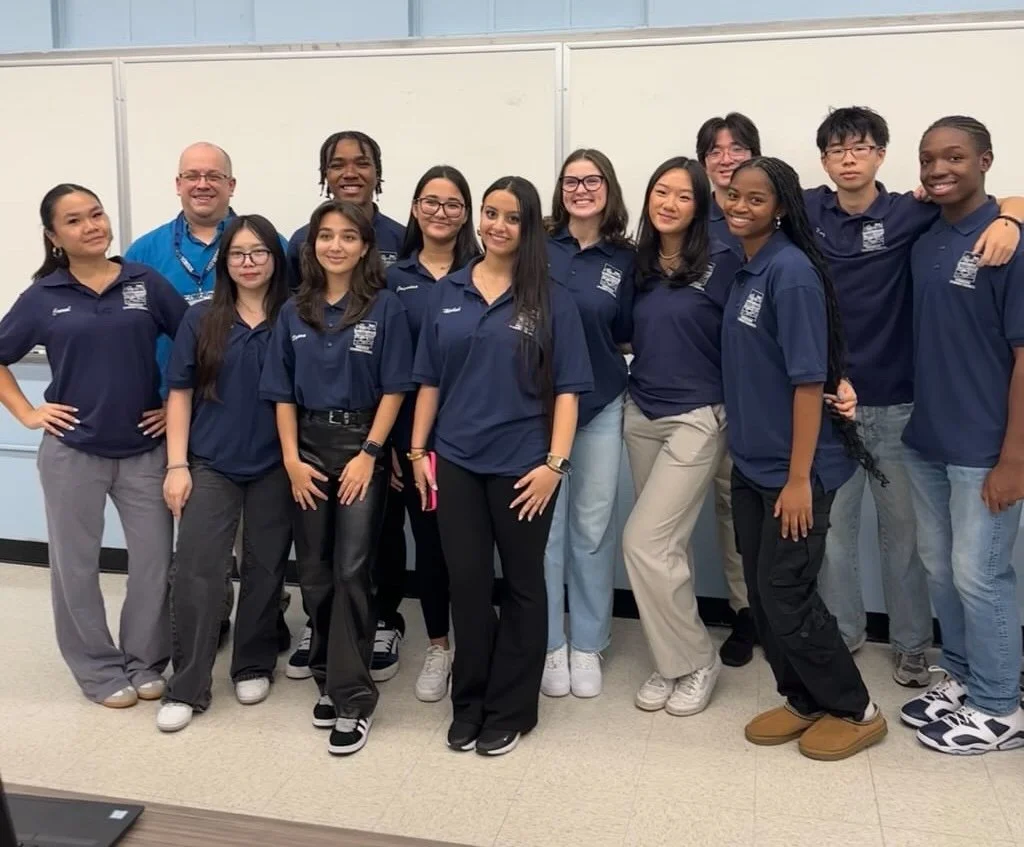Student Government Returns to Action with Brand New Positions
The student government expanded with three new positions this year. Photo: Briana Calin
By SAMURAH ISLAM, TIFFANY DONG, and JERRY LI
As the school bell rings for the first time this fall, the halls of Midwood fill with anticipation. Down the corridor, at a meeting in Room 161, the new student government takes its place, ready to meet the challenges of a new year.
The 2024-2025 team is led by Mayor Briana Calin, Comptroller Elijah Sampson, Executive Secretary Serena Li, with Senior President Raymond Chen, Senior Vice President Philip Kong, Junior President Carol Zhong, Junior Vice President Ricardo Torres, and Liaison Officer Jasmina Abidova.
Representing the underclassmen are Sophomore President Diyora Khidirova, Sophomore Vice President Constance Ng, Freshman President Kayla Ashlee Lau, and Freshman Vice President Kaitlyn Ly.
And finally, rounding out the crew are two new positions with their first ever representatives: Coordinator of Events Malak Khalifa and Interdepartmental Representative Folasade Olosundae.
“Coordinator of events was made as the student government needed a more organized way of creating and setting them up with a designated person, which is me,” said Khalifa.
The interdepartmental rep’s role is to essentially be a spokesperson for the Liberal Arts program, said Olosundae: “In previous years, student government lacked that representation, so my responsibilities mostly entail bringing up the opinions and propositions of LASI students so that we can improve the program.”
The freshman appointments work differently than those for other grades. Nominees have to attend mandatory meetings, get signatures from hundreds of students as well as the dean’s office and their guidance counselors, and also obtain teacher recommendations. This process is followed up by an interview with the student government, who then make a selection.
“At first I was really nervous, but I wanted to find a way to be involved in the school,” said Lau. “I’m thankful for the fact that I have the support from my family and Ms. Lane for giving me the confidence I needed to run.”
“I hope to create a safe community where my peers feel comfortable speaking up and being themselves,” said Ly. “I wanted to be part of the student government because I understand how hard it is to adapt to a new environment. I want to be someone who can guide them, and make it easier for them to voice their opinions.”
Reflecting on his motivations to join the government, Senior President Chen said, “I had the experience in SGO and wanted to end our high school career on a memorable note.” He highlighted his commitment to being “the portal between administrators and students by attending meetings, pitching ideas, and working on events and changes around the school.”
Kong sought senior VP after feeling inspired by previous mayor Joanne Zhu. He said, “I knew that it was much more than just working, but being able to learn new skills and form connections with other leaders with various perspectives on life.”
He also emphasized the importance of promoting non-STEM pathways. “As an aspiring pilot, I hope to open up career paths that people didn’t even know existed, to expand those passions and offer people more ideas on their future,” he said.
Zhong and Torres are focused on enhancing resources for their peers. “My top goal for this year is to implement more support for the SAT,” Zhong said. “Since junior year can be really crazy, we want to make more resources available, such as bringing in alumni to share their experiences.”
Khidirova and Ng have similar plans. “I hope to implement a peer mentorship program where upperclassmen can mentor underclassmen,” said Khidirova.
“We also want to ensure that juniors are ready for college and the [application] process because junior year can be very stressful,” added Torres.
Sampson stressed the importance of “amplifying” student voices. “I ran for this position in June because I wanted to positively impact not only my graduating class, but the entire school,” he said. “This year, I’ve been hammering home policies that I mentioned in my campaign — the buddy system and ensuring equal funding.”
One challenge the student government faces, in a school with over 4,000 people, is to “connect to every individual,” Chen said.
“With such a large population size, everyone has their own worries and concerns,” Calin said. “I aspire to continue working towards improving the communication and relaying of information to everyone.”
“Most of the time, students might not answer emails, which can lead to confusion,” added Abidova. “That’s why we have newly implemented the app Remind in hopes of solving this problem.”
Ng would also like a way for students to voice their opinions by “creating feedback forms where students can submit their suggestions and concerns.”
Sampson added, “There have definitely been challenges such as scheduling and promoting events, sometimes even figuring out the math of it all, but that’s what student government is for. We help each other make sure that things can run as smoothly as possible.”
Behind the whole team’s combined efforts, this year promises to be memorable for everyone.

